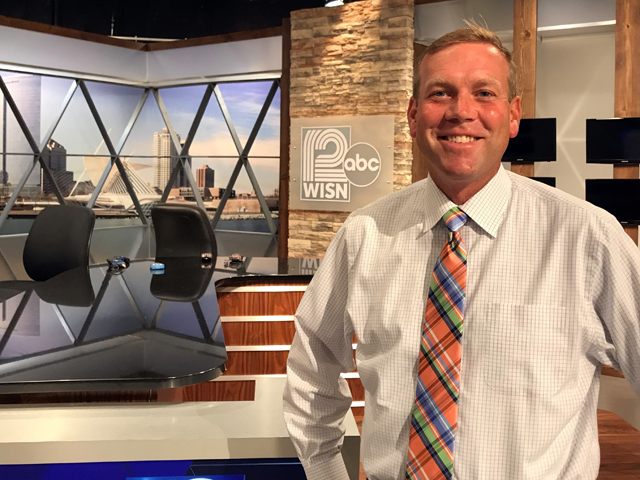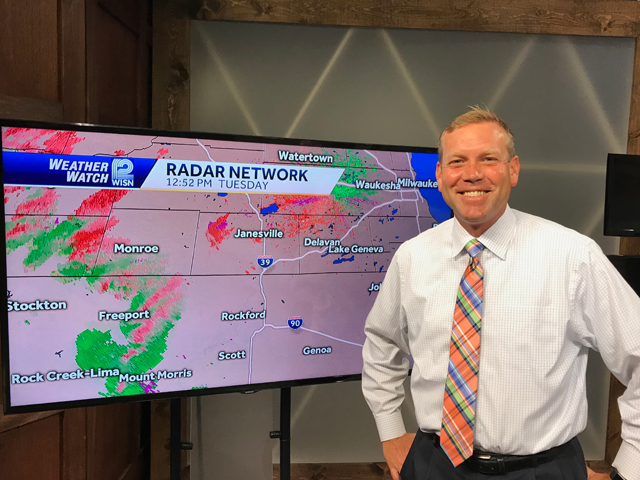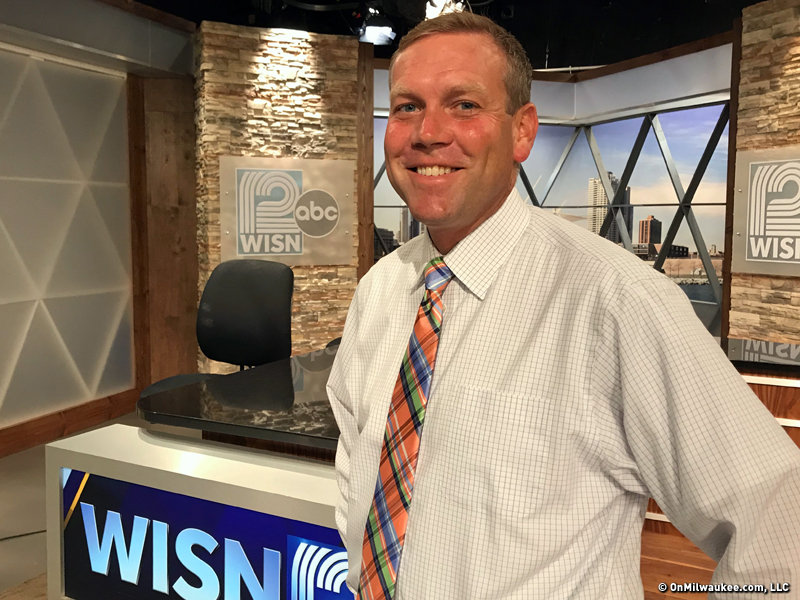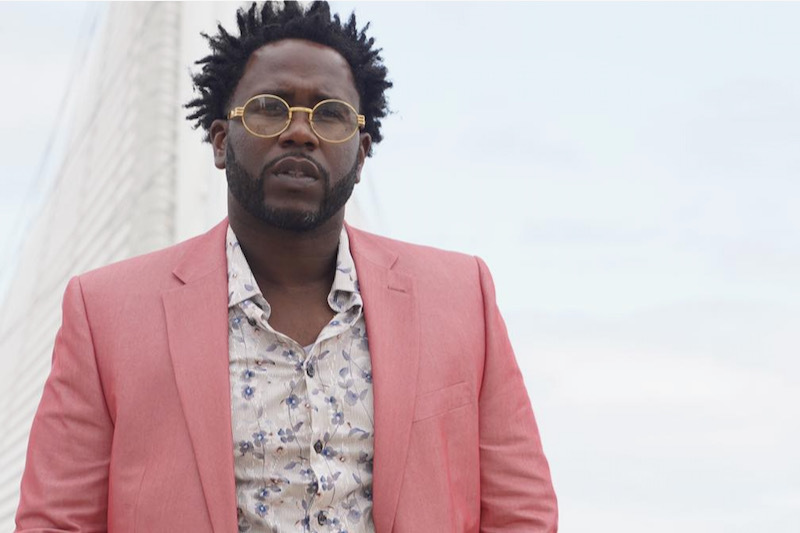You know his face, you know his voice and, odds are, if you're in Milwaukee and on Twitter, you follow his tweets.
Now that he has celebrated more than 20 years as a chief meteorologist in Milwaukee, we sat down with WISN-TV / Channel 12's Mark Baden to ask about how social media and climate change have affected his job, among other things.
OnMilwaukee: The last time I was here was to interview Jeremy Nelson, and we sat down in a conference room and the first thing he said is, "I've got to tell you, I'm leaving." So, do you have any bombshells you're going to drop?
Mark Baden: Not in my department. We are solid as can be.
Starting out, could you see yourself as a chief meteorologist?
Oh, in my dreams it was always there. My goal when I first started, one, I never wanted to be a television meteorologist when I first started out. I wanted to be a researcher. My first real thing I wanted to do was be a researcher in Antarctica for a year.
And did you ever get to do that?
Never have done it, still I will get to Antarctica at some point in my life, God willing. So, hopefully that does happen.
Weather research?
Yep. I was a meteorologist; I mean, that's what I started going with when I was in college. But then they started a campus TV station my sophomore year, and lo and behold here I am today, 26 years later.
There are meteorologists on TV, and there are weather people, who are not meteorologists. Are there other meteorologists in the business who look down ...
Oh, there is a lot of that. There's seal envy, meaning that if you have this certain seal, whether it's AMS, the CBM, which is from the AMS, and which is their higher version. And then there's the NWA ... It's rarer and rarer now to have somebody on air doing weather that is not a meteorologist. That has definitely changed.
You don't get a lot of people with puppets anymore?
No. Listen, we've had dogs here (in Milwaukee), not here (at WISN) and the puppet.
The beloved Albert the Alley Cat.
Albert is still loved by so many. It's amazing.
So you're saying most of you actually have a seal nowadays?
A degree in meteorology or something similar. And then you have to take a test to get the seal, plus to make sure that you show them you're broadcast material, and that you know what you're talking about. You can demonstrate scientific knowledge, that you're not just out there making things up.

Do you have to do periodic stuff to maintain that?
You do. For my seal, which is the CBM, you have to have ongoing credits. Whether that's going to conferences, taking online classes. For me, teaching also helps. I teach at Concordia (University) every spring, just a meteorology course, that gives me points, as well.
It's a points structure and you have to have 15 points every three years. It's not hard to do if you're able to go to conferences, which, thankfully, I'm able to. That gives me points, and then you take extra stuff while you're there.
I generally think that weather forecasting on television news has improved, likely because of technology, but is this also kind of a key factor in why it's gotten better?
I think definitely. Well, there are a lot of people that think ... we call them weatherologists. Because everybody can look at models. They try to decipher things their way, and then they'll take one of our models that goes out 384 hours in advance and they will post that 384th hour saying, "Heads up, in two and a half weeks we're going to get a blizzard in Wisconsin."
And so then it's the constant battle for us as meteorologists to work against that because it's inevitably going to be wrong. And that's something, especially with snow forecasting, that happens a lot.
From what I've heard from other meteorologists, Milwaukee is a challenging place, because of the lake.
A meteorologist in every market will say, "Oh, but we've got this river effect," "No, it's the mountains that do it." Yeah, for us, sitting next to Lake Michigan is always a great challenge. It is again this year, it has posed a great challenge.
I feel like you hear a lot about forecasts based on whether or the wind comes around from over the lake, right?
And it makes a huge difference. The official temperature's taken at Mitchell (Airport), which is only a mile and a half from the lake. If you get the lake breeze that comes in an hour earlier than what you think, you might be off by five or six degrees on the cold side. If it holds off for one or two hours later, you're going to be off by five to 10 degrees the other way in the springtime.
I bet your Twitter is lighting up at that point.
Well, it's okay if you're wrong and you say it was going to be colder and it ends up warmer in the springtime. If it goes the other direction, people are not very happy.
We used to do a five-degree guarantee here, which sounds like that's really easy to be within five degrees. And in certain parts of the year it is. In the winter it's not hard at all, in the fall it's not hard, but in the spring and the summer here, it's very very difficult. That was when I first started here, all it did was make you look like an idiot, because, "I was wrong again." They do it in Madison.
Did you have a tally on the screen?
Oh yeah, it was terrible. So you felt like the worst forecaster in the world even if you were not necessarily wrong in terms of the forecasting, the sky conditions, it was just that the temperature didn't work out exactly how you thought because of most likely the lake breeze, when it kicked in.
So every day you were basically making a bet with viewers ...
Well, I've hidden my Magic 8 Ball and my dart board, so you can't see the real tricks of the trade.
You're not from here originally, right?
I'm not, I was born in Houston, Texas, but I only lived there for three years. I grew up in St. Louis, I grew up in Ferguson, you've probably heard of it. So, that's what I consider my hometown. Loved it, had a great existence, but also, I love snow.
We didn't have it very much in St. Louis so I can remember the years that we had the snowstorms that shut school sometimes. If we had a big one it would shut school for a week because we didn't have nearly enough snow plowing equipment and they didn't know what they were doing.
But love for weather has always been there. I saw lighting strike a tree when I was in the second grade.

And you were struck, so to speak.
I was hooked. Oh, I was. It sounds hokey, but really, you can find us that kind of story whether somebody went through a hurricane, saw a tornado, was in a flash flood, something. And there are so many meteorologists that have that kind of story. And that's what got their imagination going.
Did your parents and your teachers nurture that in you?
They did. My dad was a professor, my mom was a teacher, my sister's a teacher, my grandparents were teachers – I had a lot of teaching in my family. It was a little bit different certainly once I was going the television route, or at least trying.
It’s a tough go. Your chances of making it, and I would be the first person to say I'm the most fortunate person I've ever met in terms of making it in this business, I've had a lot of good luck. People say you make your luck, but also I've had some good fortune along the way.
So, was Milwaukee a plumb gig when you got it? Was this ...
It was a plumb gig.
And is it still a plumb gig?
Oh yeah. My first job, I was part-time in Columbia, Missouri, making five bucks an hour. Got my first full-time gig in Sioux City, Iowa. Happily, I'm not there anymore. No offense, people.
Making $6.50. (Laughs)
That's about right! I think it was about $6.50, $7, it was $13,000 a year. Then I made the huge jump to my hometown. I was plunked from Sioux City, after a year, to part-time in St. Louis, but that was a union gig. I mean, I made way more money than I ever had, I'm living at home. I thought, "Okay, this is where I want to be, this is my hometown, I'm going to stay here, I'll just work my way up over time."
My GM that was in Sioux City became GM in Des Moines, and hired me as chief. Really stupidly young. I was chief in Des Moines at 23 years old. I was the youngest chief I think in the country at that point.
And then I was there for three years and the Milwaukee job came open. To be honest with you, I didn't know anything about Milwaukee. I had never been to Milwaukee. This is in '97. I came here for the interview, I think it was 15 or 18 below with a wind chill of about 50 below. It was cold and snowy, but I was coming from Iowa so it wasn't a big deal. I came here, and I thought, to be honest with you, this was just another gig. My fifth move in five years, you know?
I was going to go on, next was Chicago, then New York, "Good Morning America," the whole thing. Then I got to Milwaukee and I was engaged, got married, started having kids. I love this city, wouldn't want to leave it.
Yeah, that's kind of how it happens isn't it?
It pulls you in.
Is your wife from here?
She's not; she's from Minneapolis.
Interesting that neither of you being from here, you've decided to stay here.
Without question, yeah.
Neutral ground? You don't have to fight over whether you're going to St Louis or Minneapolis.
It's not too far; it's about the same for both, which is nice. About five and a half hours to Minneapolis, about six hours to St. Louis.
When did you become chief here?
Right away, as soon as I was hired.
Really?
Yeah, I was chief in '97. Now, there was another chief at the time who's name was Mark Strell, who was the guy who took over after John Malan. He had the unenviable position of taking over from somebody who was very popular. And Strell, who's doing weather still in Chicago, he's a good friend, he was a gentleman about the whole thing. It was very strange how this all played out.
To have co-chiefs?
Well, yes. Initially, I was doing the 5 and 10, and Mark was just doing the 6, and that was weird. That lasted six months, then they paid him out the rest of his one year that he had on a contract. He got a new gig in Rockford and then from there he's been weekend guy in Chicago and doing very well.
What does it mean to be chief?
It used to mean the person, the man or woman who's doing the 10 o’clock show. That's changed a lot. Rob Haswell at Channel 6 is the chief, and does mornings. Channel 4 does not have a chief anymore, I don't believe that they will name a chief.
Is it behind the scenes stuff, or do you manage the other people on staff?
Yeah, there's a little bit of just keeping everything in order. "Let's make sure graphics look the same from one person to the next." You're kind of giving the overall department head. I don't even like that. It is truly a team here. If anybody's in charge it's Sally (Severson), she always in charge. She's the best.
You just said you're happy to stay here, but for some is Milwaukee still a stepping stone? Are people still thinking like you did? "All right, I'll go to Milwaukee for a while, but then I'll go to Chicago, and then Chicago will lead me to New York or L.A.?"
I think especially for people that are from Chicago that end up working in Milwaukee, they still have the goal of working in Chicago or maybe elsewhere, and have bigger aspirations. I mean, I guess for me it was finding great comfort here. I work for a fantastic company, and I'm not just saying that because you're taping this.
But that doesn't hurt. (laughs)
They really are. I work for Hearst – they still are a spectacular company, treat their employees very well. We have decent benefits and I still have a pension.
How has social media has changed what you do? I assume you spend as much time as ever on the forecasting, and on the research, and getting the newscast ready, but now your phone is constantly buzzing. I presume that in addition to the irate as well as congratulatory phone calls, you get irate and congratulatory texts, tweets, emails, Facebook messages ... how do you deal with all that?
Well, you'd better have a thick skin if you're going to be a meteorologist, and I do. I laugh at the nasty emails and I respond to almost every single person. I kill them with kindness – I have forever.
It works, doesn't it?
It does. So many times, somebody will come back ... The biggest thing that we have around here is if we end up breaking into their program, because we have some type of warning that we feel like the public needs to know as soon as possible. That might be over a program that they really passionately like.
That might be a Packers game (on some stations).
Once in a while we'll get a Packers game if it's on ESPN. Now, back in the day when we were "Monday Night Football" on ABC, that was the worst. You have to really be sure. I mean, but weather will trump. If there's something that's really worthwhile, if there's lives in danger. I mean, that's kind of when I take away the happy-go-lucky Mark. I mean, I do realize that there's a service to be done, and thankfully around here we have not had a whole lot of severe weather in quite a few years.
What do you think it is that makes people so interested in weather that we give this chunk of the news window to it? Why do people want it that much? Why are they so passionate that they're really angry if you're five degrees off?
Weather is the great commonality. Everybody talks about it. You talk about it with your parents, your grandparents, your kids, your co-workers, people you meet on the street. You walk up to the bus stop, you ride your bike, you take a run, what do you talk about? It's the first thing that comes out, "Oh, it's a sticky one out there, it's tough to run in this today."
"Hot enough for ya?"
Exactly. "Wow, it's tough to get around today." "Never been this cold before this time of year." Oh, yes. I think people, they still, as much as they use their smartphones and they tell me now what the weather is going to be because their apps tell them.
The apps are wrong all the time!
Bingo, yes, the apps are bad. Weather apps usually take from just one model and spit a number out and spit a percentage of precip chance. It's not usually very accurate. There's not a good one out there that I've found.
What's amazing to me is how specific they are. They'll give you the hourly forecast. "1 o’clock it's going to be raining." But then it's wrong so often, why would they even go out on a limb like that?
Yes. I think people are hoping that it gets to that point where we're that accurate, or an app is that accurate, we're a long way away from that. Technology's improved dramatically.
When I was in college, 30 years ago, we didn't have the internet, so you would analyze, by hand, all your upper air charts, which would come in on a huge old fax machine. When I started this 30 years ago I would make a forecast using 40 maps. Right now I look at about 400 to 500 maps, on the small end, every day to make a forecast.
And here I am wasting your time. The maps are starting to pile up in the other room. (Laughs)
Well, everything's on the internet, so we all have access to it. But you were talking about social media and how that's changed. It used to be that I had a lot more downtime. I try to pick and choose, if I'm with my family I really hold back as much as I can.
Now, if we have weather going on, I feel like it's my responsibility, even on vacation, such as I was in Florida last week, I was still watching as we had the heavy rain here. I'm seeing how bad it is, I'm throwing out tweets when need be, or Facebook posts, or once in a while on Instagram, but that's usually family pictures.
So you're always staying up-to-date, and so you're with your smartphone with you at all times. 365 days a year.
Do you get 'the look' sometimes when you're on vacation and you're on the phone?
Oh, yes. It's the same look I give my kids to get off their devices; it's the look that my wife gives me to get off my device.
There's an upside to the social media, too, right? Now when there is something that needs to get diffused, you can get it out there.
I'm a giant Twitter fan because it's immediate. You get information, most of the time it's pretty accurate. You got to be careful, people are always sending fake stuff. You watch that. But overall it's 'boom.' There were funnel clouds today in southwestern Wisconsin, so we're seeing the video and pictures of that instantaneously.
It's so amazing that you get to see something almost as it's happened, sometimes as it's happening if it's a storm chaser live. To think of how that's changed really in the last 10 years is remarkable.
What do you think about climate change? Is it affecting weather here?
There is no doubt in my mind that climate is changing. I changed my mind on about 12 or 13 years ago at a conference in Chicago. I was invited to the Field Museum with a group of other broadcast meteorologists. I sat next to one of the foremost climate scientists in the world, a guy named Dr. Ben Santer, and he probably remembers me because all I did was pepper him with questions for two days in a row. That poor guy. Because I was a skeptic. I mean, there was already a lot of things that were happening.
I believe that the climate is changing; it will be interesting to see what Wisconsin looks like in 50 more years, especially by the end of the century.
I truly believe that humans are creating an issue. Is it as bad as what some people think? Probably not. Is it something we should be concerned about? One hundred percent. It's a shame that it's politics, and it's taken the whole conversation over. It's not a Democrat/Republican issue. It has nothing to do with politics. If we can just get back to pure science that would be great.
Okay, I'm going to ask you a question for Jeff Sherman. This is the question he always closes with, so I would be remiss if I did not ask you to define success.
Being as lucky as I've been. I've had so many great things happen in my life along the way, if it's my personal success. Do I feel successful? Yeah, fortunately. I've been given great opportunities here. I had the opportunity to leave, I chose not to.
I'm very happy I did not. It's a great fit. My success really, more than anything else, is I've got three great kids, a good marriage ... that defines more of my success than anything else.
Born in Brooklyn, N.Y., where he lived until he was 17, Bobby received his BA-Mass Communications from UWM in 1989 and has lived in Walker's Point, Bay View, Enderis Park, South Milwaukee and on the East Side.
He has published three non-fiction books in Italy – including one about an event in Milwaukee history, which was published in the U.S. in autumn 2010. Four more books, all about Milwaukee, have been published by The History Press.
With his most recent band, The Yell Leaders, Bobby released four LPs and had a songs featured in episodes of TV's "Party of Five" and "Dawson's Creek," and films in Japan, South America and the U.S. The Yell Leaders were named the best unsigned band in their region by VH-1 as part of its Rock Across America 1998 Tour. Most recently, the band contributed tracks to a UK vinyl/CD tribute to the Redskins and collaborated on a track with Italian novelist Enrico Remmert.
He's produced three installments of the "OMCD" series of local music compilations for OnMilwaukee.com and in 2007 produced a CD of Italian music and poetry.
In 2005, he was awarded the City of Asti's (Italy) Journalism Prize for his work focusing on that area. He has also won awards from the Milwaukee Press Club.
He has be heard on 88Nine Radio Milwaukee talking about his "Urban Spelunking" series of stories, in that station's most popular podcast.




.jpg)


